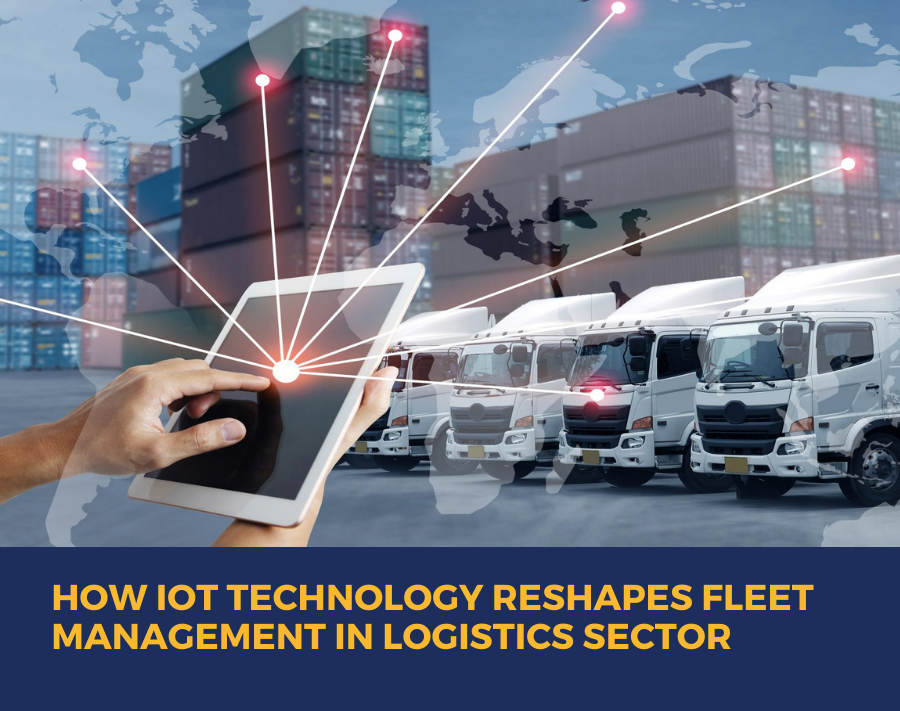Revolutionary IoT technology can bring radical changes in various industries and promote automation in various processes. Core industry sectors including manufacturing and logistics are the key beneficiaries of Industrial IoT (IIoT) technology. Let’s understand how advancements in IoT technology facilitate transportation and logistics by reshaping the fleet management system.
Fleet management plays a vital role in streamlining operations of multiple industries. There is no exaggeration in mentioning that fleet management is a backbone of the logistics sector. These days, it faces challenges due to various parameters including safety concerns, timely delivery, productivity, and efficiency. There, IoT smart transportation solution lends a helping hand, It can enable the logistics companies to leverage the data derived from the vehicle and generate higher revenue through improved fleet management.
Importance of IoT in Fleet Management System
Fleet or a group of commercial vehicles is aimed at ensuring the reliability and continuity of numerous business processes. Be it courier services, healthcare services, or manufacturing plants, all core industry sectors depend heavily on the fleet. Therefore, it is of utmost importance for transportation and logistics companies to implement dynamic and systematic fleet management. Here, IoT in logistics companies to manage the fleet effectively while saving a great deal of time and effort.
As enterprises grow and businesses tend to expand across the borders, the traditional fleet management system has become outdated. IoT can ensure a quick and secure supply of all the necessary products or goods for various industry sectors in a modern fleet management system. It also brings automation to boost performance and sustainability. What’s more, logistics companies can monitor the position of their fleet in real-time with the help of IoT technology.
Let’s go through some of the use cases and key benefits of IoT in fleet management.
Top Use Cases of IoT for Fleet Management
1. Real-time Data Acquisition
The biggest advantage of Industrial IoT is it can fetch real-time data through sensors. It is possible to track every aspect of your fleet including fuel level, tire pressure, and speed with the help of built-in sensors. The real-time data also enables the logistics company to make necessary decisions and contact on-duty fleet members instantly.
2. Automation
IoT smart transportation solution is designed to automate notification and warning systems. It helps drivers avoid traffic jams and diversions while providing necessary information like nearby gas stations and restaurants. Automation in a fleet management system can save a lot of time and effort for the management.
3. GPS (Global Positioning System)
When it comes to remote monitoring and tracking, GPS devices are always useful. IoT can fetch and transmit real-time data using GPS technology for assisting fleet operators to monitor the vehicle status and activities of drivers. It is necessary to ensure the safety of drivers and provide improved services.
4. On-Board Diagnostics
OBD or On-Board Diagnostics can compile the critical data on a single, customized dashboard. It is compatible with the cellular networks and provides a report to the fleet managers based on the analyzed data. It can also reduce the audit time significantly.
Also Read- How IoT is Improving Transportation and Logistics
After use cases, let’s move to the key benefits of IoT technology in logistics and fleet management.
Top Benefits of IoT Smart Transportation Solution
Some of the top benefits of IoT in the transportation and logistics sector include –
1. Enhanced Driver Safety
IoT-powered fleet management solution enables transportation companies to monitor driver actions and ensure the security of drivers. When it comes to mitigating potential risks associated with conflicts, vehicle downtime, and accidents, IoT remains beneficial in the fleet management system.
2. Preventive Maintenance
IoT plays a significant role in preventive maintenance. It contributes to reducing unwanted downtime by predicting the risks and sends warnings for inspection. It can increase the vehicle’s life and reduce maintenance costs over the period.
3. Improved Performance
The efficiency of your fleet depends largely on the engine’s performance. Sensors offer active monitoring and assist the transportation company to predict potential risks to the engine. It results in improved performance and increased life for the engines.
4. More Fuel Efficiency
Optimized routes and preventive maintenance can enhance the engine’s performance. It can increase fuel efficiency. What’s more, IoT-powered transportation system also ensures that vehicles do not run out of fuel abruptly.
5. Better Compliance
This is one of the biggest benefits of IoT-based solution. It assists logistics companies to reduce carbon emissions and comply with prevalent standards of safety and pollution prevention.
6. Real-time Remote Tracking
IoT in fleet management enables the logistics sector to ensure on-time delivery and security of fleet with real-time remote monitoring functionality.
Concluding Lines
The transportation and logistics sector passes through trying times. A customized IoT in transportation can assist you to manage fleet effectively and enable your company to offer timely delivery with real-time tracking. Time is just right to implement IoT-based solution in your transportation and logistics company.
Do you want to stay ahead of the curve by managing your fleet effectively? Simply send us your requirements at info@rejigdigital.com and our expert professionals will get back to you soon with the roadmap.


